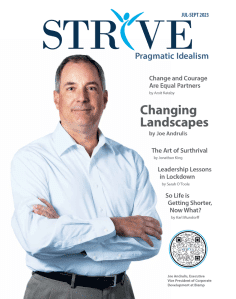
Normal: It is the box where we compartmentalize our lives. Its walls are constructed of the status quo and it holds within it our beliefs and expectations, our traditions and our dreams. It is the vessel that frames our understanding of the world, and accordingly, defines our personal spaces and comfort zones. Normal demands conformity. Its sides forming the barrier that confines our thinking and limits our potential. The fact is, normal is a creativity killer.
Today, in the midst of the COVID-19 pandemic, it is not uncommon to hear the phrase, the world is broken, nothing is normal. I prefer to think of the world and what we consider normal as breaking open. This is not to make light of the current circumstance; the situation is unparalleled, dire and severe. But in the words of Rahm Emanuel, “you never want to let a serious crisis go to waste.”
There is a difference between something breaking and something breaking open. Breaking open eliminates confinement. The effect liberates and allows for expansion of creative thought, and consequently, new opportunities. It has been said that the beauty of music is not in the notes; the beauty resides in the space between them. The same holds true for all forms of creativity and thus, personal growth and societal progress. The potential for improvement is not in the walls of the container we call normal. The possibilities for greater accomplishment are in the gaps that appear between the pieces when normal fractures.
Ironically, the area we call our comfort zone, is often not comfortable at all; it is merely familiar. It is the familiar-zone that makes us long to get back to the 90-minute commute that we so despised only a short-time ago. It is also the familiar that causes us to long for the daily routine of our pressure-cooker job.
Familiar is seductive, and thus, hard to resist. But our affinity for the familiar also carries a cost. By making us rebellious to even incremental change, we are often unable, or unwilling, to consider creative ideas and solutions that have the potential for greater enjoyment and overall wellbeing. In fact, defiance of change has become so intense that we now refer to it as disruption.
We all view the world through a lens constructed of our own experience. In my case, as someone who has been a purveyor of technology for the past two decades, I have witnessed how the status quo and our affection for the familiar has limited our ability to engage and embrace change.
I have seen business executives and school administrators alike struggle to drive adoption of new and innovative tools into their organizations with limited success. The, I’ve done it this way for years and I am not about to change attitude, has the power to neutralize even the best idea and most well-intended leaders. Likewise, I have seen staff bring the most innovative and creative ideas to their management teams only to have the weight of an individual leader’s fixed mindset crush not only the idea, but enthusiasm as well.
But contained within the COVID-19 event is the power to force universal change. The embrace of remote collaboration and education technologies is one of countless examples. Almost, instantly the technology shy and change-resistant from mainline staff to senior executives were forced to embrace disruption in order to remain productive and relevant.
This single shift has cascading implications that extend well beyond the immediacy of their use and function. That 90-minute commute, for many, is no more, representing a win for overburdened highway infrastructure, the environment and sanity. The same holds true for the business traveler. Once, attending an important meeting via video was referred to as mailing-it-in; no longer. Additionally, school districts that have struggled to offer a diverse curriculum and access the best educators have now been dipped into a world of remote delivery that presents an opportunity to reimagine access to both.
The COVID-19 pandemic hit the world in tsunami-like style. Its power transforming virtually every aspect of modern life. The impact carrying with it a power that propelled even the most resistant to change over the walls of their familiar zones and into new patterns of behavior.
There is opportunity in this transformative force. Of course, the natural and predictable response has been a clamoring to get back to normal as quickly as possible. And for good reason, the experience has been tragic, expensive and maximumly disorienting. But before we mindlessly jump back into the box, it is worth taking the time to look around and take stock of the experience and lessons learned, seizing the hard-won opportunities that will enable us to improve not only individual wellbeing, but the world in which we live.
The COVID-19 pandemic is a serious and costly crisis, let’s not waste it.



